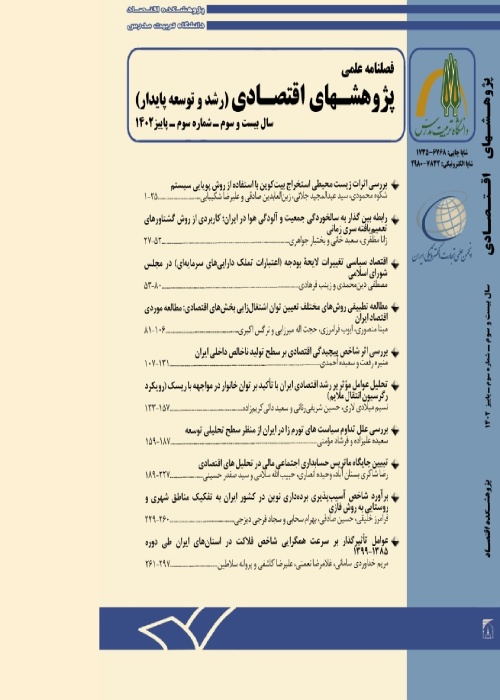Evaluating the Effect of E-government Expansion on Labor Productivity: The Case of Developing countries
In recent decades, governments have taken an important step towards an information society, better service delivery, and improving the welfare of their society by developing e-government. The development of communication technology and e-government is considered an effective factor in economic growth and development and high labor productivity. The aim of this research is to investigate the role of e-government development on labor productivity in developing countries including Iran using the vector autoregression approach with panel data (P-VAR) over the period 2003-2020.
Sims(1986) first used a vector autoregressive (VAR) model to analyze the dynamic relationships among multiple variables The model assumes that all variables are endogenous. This model uses the lags of all endogenous variables to test the dynamic relationships among all variables. Holtz-Eakin et al.(1998) extended the vector autoregressive model to make a perfect combination of panel data and time series models, making it a powerful analytical tool for macro-dynamics research. To examine renewable energy consumption, population aging, and agricultural green total factor productivity in the same framework, this paper constructs a PVAR model based on the traditional vector autoregressive model. A Panel vector autoregressive model(PVAR) includes the analysis of the Forecast Error Variance Decomposition– FEVD and the analysis of the Orthogonal Impulse Response Function – OIRF. Parameter estimation in the PVAR model is performed using the Generalized Method of Moments. For the stability of the regression equations, a polynomial matrix is used and a partial unit root test is performed for all variables based on the augmented Dickey-Fuller test.
The results of the study show that due to a positive shock in the development of e-government, labor productivity reacts strongly and positively, which indicates that the development of e-government, in the long run, can lead to increased labor productivity in developing countries. The results also show that in developing countries, the impact of health shock is greater than the impact of other variables such as physical capital formation shock and education variables.
Today, the importance and impact of the development of new technologies such as artificial intelligence, the internet of things, and big data in different sectors are so great that this period is referred to as the age of communication. Entering this era and the development of electronic tools has changed the needs of people and societies. The aim of this research was to investigate the role of e-government development on labor productivity in developing countries. The results of the modeling show that the variables of health, physical capital, education, and e-government development are the main factors affecting labor productivity, respectively.Also, the results of the research show that the response of labor productivity to the shocks of labor productivity itself was positive in the long term. This effect gradually decreases. Specifically, when a positive shock occurs in labor productivity, this situation is considered a signal for the labor force to continuously seek to improve its productivity. According to findings, the reaction of labor productivity to the positive shocks caused by the development of e-government has also been positive, which indicates that the development of e-government has a long-term effect on labor productivity and can lead to an increase in labor productivity in the long run.According to findings, in developing countries at the end of the 10th period, about ten percent of labor productivity changes are explained by e-government development shocksLabor productivity. As expected, the impact of the health shock on labor productivity is positive. Quantitatively, the effect of this shock is greater than the shock caused by education and physical capital, which shows the significant impact of health on labor productivity in developing countries. The reaction of labor productivity to the shocks of education is consistent with theoretical expectations. Also, according to expectations, physical capital has a significant effect on labor productivity in developing countries.In general, it can be seen that in developing countries, any positive change in the development of e-government has an impact on labor productivity (based on the decomposition of impulse-response functions and the analysis of the variance of the forecast error). Also, the response of labor productivity to the changes in the field of health has been greater. Therefore, the authorities of developing countries should improve the productivity of the workforce, pay attention to the development of human capital and physical capital indicators, and implement and develop the e-government as best as possible.
- حق عضویت دریافتی صرف حمایت از نشریات عضو و نگهداری، تکمیل و توسعه مگیران میشود.
- پرداخت حق اشتراک و دانلود مقالات اجازه بازنشر آن در سایر رسانههای چاپی و دیجیتال را به کاربر نمیدهد.



